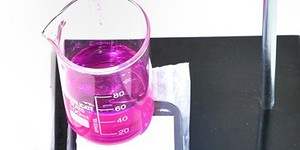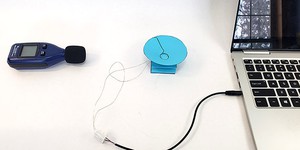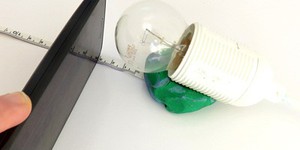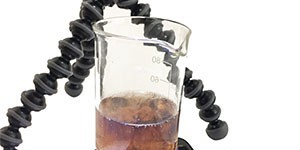Ninth Grade, Science With Your Smartphone Science Projects (7 results)
|
Have you ever wondered why some foods taste really sour? Vinegar is one example that you might know from salad dressings or pickles. They taste pretty sour, right? There are many different types of vinegar that you can buy to use around the kitchen for cooking and pickling. The chemical compound that gives vinegar its tart taste and pungent smell is acetic acid. Do you think all the different vinegars contain the same amount of acetic acid? Are there some that are more sour than others? How…
Read more
Featured
Have you heard that garlic powder is supposed to inhibit the growth of bacteria? Which do you think would make a better disinfectant: a solution of garlic powder or a solution of bleach? This project shows you a straightforward way to compare the effectiveness of different disinfectants (or other antimicrobial agents), by measuring zones of inhibition on a culture plate.
Read more
Can you build a working speaker out of paper? How does a speaker's ability to play low or high-pitched notes depend on its size? Explore the science of sound in this project as you build and test your own speakers in order to answer these questions!
Read more
New
Remembering to take medicine at the right time can be hard, especially if you need to take multiple medications at different times of day. It might not be a big deal if you forget to take your daily multivitamin, but for some people, forgetting to take medication at the right time can be dangerous. What if you had a device that could not only set off an alarm at the right time, but also automatically dispense the right pills for you? In this project, you will build an automatic medicine…
Read more
Have you ever looked up at the stars at night and wondered how fast they were moving or how far away they were? By studying how the brightness of a star changes with distance, you can answer those questions. In this astronomy science project, you'll create a model of starlight and use a sensor app with your smartphone to discover the key relationship between brightness and distance.
Read more
You might know that your body needs oxygen to keep going, and that you breathe out carbon dioxide as waste. What happens when you exercise? You have probably noticed that you breathe faster, and your heart beats faster. What triggers your body to respond in this way? How does it "rev up" to keep your muscles going? In this project, you will get a peek into the fascinating science of exercise physiology and find out—with the help of a color changing reaction.
Read more
Have you ever seen a chemical reaction that makes a solution change color? Probably. But what about a solution that changes color and then changes back, not only once, but many times? Sounds pretty exotic! Whereas most chemical reactions only move in one direction from reactants (starting chemicals) to products, in these rare oscillating reactions, the reaction products appear and disappear for a number of cycles. Because the products are colored, the solution appears alternately blue, then…
Read more
New
Artificial intelligence (AI) programs can now generate photorealistic pictures of people who do not exist in the real world. How can you tell if a picture is of a real person or a fake, AI-generated person? What features of the picture do people use to decide whether the face is real or AI-generated? In this project, you will explore these questions as you ask volunteers to look at both real and AI-generated pictures of human faces.
Read more
Many things in nature are periodic: the seasons of the year, the phases of the moon, the vibration of a violin string, and the beating of the human heart. In each of these cases, the events occur in repeated cycles, or periods. In this project, you will investigate the periodic motion of a spring, using a mini Slinky®. You can also measure the motion of your spring using a smartphone equipped with a sensor app. Basic physics will then allow you to determine the Hooke's Law spring constant.…
Read more
The renowned pianist Vladimir Horowitz once said, "The most important thing is to transform the piano from a percussive instrument into a singing instrument." In this project, you will learn how you can make piano strings sing using sympathetic vibrations. Find out which notes make another one sing the longest by measuring their sound intensities using a smartphone equipped with a sensor app.
Read more
|
Explore Our Science Videos
Reaction Rates: When Surface Area Matters! Lesson Plan Introduction
Make A Tissue Paper Parachute - STEM Activity
Stretchy Balloons! Fun STEM Activity















